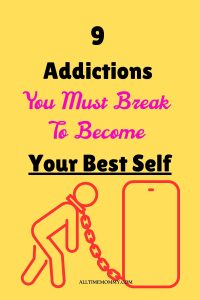Discover the 9 addictions you must break to become your best self. Learn how to unlock your full potential and lead a healthier, more fulfilling life. We give you strategies and tips to overcome unhealthy addictions so that you can start your journey towards becoming your best self today.
Have you ever wondered what’s holding you back from achieving your true potential? We all have aspirations, dreams, and a vision of our best selves. But certain habits and behaviors stand in our way.
If you’re ready to unlock your full potential and live a more fulfilling life, it’s time to identify and eliminate these self-sabotaging actions.
This blog will delve into the crucial things you must stop doing to become your best self.
From the obvious to the more subtle, understanding and overcoming these obstacles is essential for personal growth and success.
9 Addictions You Must Break To Become Your Best Self
1. Too Much Attachment to the Result
Focusing too much on the result can make you impatient and frustrated with the process.
Mama,
When I started blogging, I thought I’d become a millionaire within almost three months. The thought of being a millionaire really motivated me to stay up late finishing up projects.
But one year later, I still had nothing to show for my hard work. Had it not been for my passion for writing, I would have abandoned this course long ago.
Too much attachment to the result refers to excessive focus and emotional investment in achieving a specific outcome or goal.
While setting goals is essential for personal growth and achievement, becoming overly attached to the result can have several drawbacks.
As such, you need to be flexible.
If things don’t turn out the way you want, you might become overly discouraged. This can lead to stress, and discouragement especially when progress is slow or obstacles arise.
An intense focus on outcomes can lead to an overlooking of the importance of the journey and the lessons learned along the way.
Yet Personal growth often comes from the experiences and challenges encountered during the process, not just the final achievement.
Additionally, when you are fixated on the result, the fear of not achieving it can become overwhelming. This fear can prevent you from taking necessary risks, trying new things, or learning from mistakes.
So, How do you break free from this addiction?
- Value the process, and Embrace the Journey.
Shift your focus from solely the result to the process. Appreciate the learning experiences, growth, and progress you make. Celebrate small victories and milestones.
- Detach from Outcomes
While having goals is essential, try to detach your self-worth from achieving them. Focus on the effort and improvement rather than just the outcome. This mindset can reduce anxiety and increase satisfaction.
Related:
8 Life Lessons I Wish I learned In My 20s
2. Unhealthy Comparison
Comparison is good if it’s meant to push you to get out of your comfort zone.
However, most people get stuck in unhealthy comparisons. They always measure their own worth, success, or progress against others in a negative or detrimental manner.
If I have to revisit my blogging journey, I felt intimidated by huge names in the blogging industry. I felt like I never had what it took to write the way they wrote.
This was my thought process;
I am not a native English speaker; in fact, English is my third language. I don’t have a huge following, I’m a newbie, and so I thought.
But then I realized;
I was not there to talk about what they were talking about. I was not there to write as a native English speaker. All I needed was to do what I love and add value or solve someone’s problem. That is all that mattered, and here I am, still counting my blessings.
Unhealthy comparison often leads to feelings of inadequacy, envy, and self-doubt.
When you focus on what others have or what they can do, you might overlook your strengths and accomplishments.
You lose sight of your own identity, values, and goals.
You might prioritize their needs and opinions over your own, leading to a diminished sense of self.
You will set unrealistic expectations because you aspire to match someone else’s achievements without considering their unique circumstances, talents, and experiences.
Seeing others succeed where you feel you are falling short can be demotivating.
Instead of inspiring you, comparisons might make you feel that your efforts are futile, Yet Personal growth is about improving yourself, not about outdoing someone else.
So, How do you break this addiction?
- Shift Your Perspective
Understand that everyone’s journey is unique, and people often showcase only their highlights. Remind yourself that you don’t see the complete picture of others’ struggles and challenges.
- Focus on Your Strengths and set personal goals.
Make a list of your strengths, achievements, and unique qualities. Regularly remind yourself of these attributes to reinforce your self-worth and confidence.
Concentrate on your own goals and progress rather than measuring yourself against others. Personal goals help you focus on what truly matters to you and track your growth.
- Practice Gratitude
Develop a gratitude habit by regularly reflecting on what you’re thankful for. This shift in focus enables you to appreciate life and reduces the urge to compare.
Related:
9 Things You Should Silently Eliminate From Your Life If You Want To Level-Up
3. Waiting for the Perfect time and Conditions to Start
Taking action, even in less-than-ideal conditions, can lead to progress, learning, and personal growth.
Most people, however, tend to wait for the perfect time and conditions to start.
But big question is; when is the right time?
Ancient wisdom shows there is no such thing as perfect time.
People tend to create circumstances, including the so-called perfect conditions.
Time is a finite resource. Waiting for the perfect time means you are losing valuable time that could be spent taking action and making progress.
Furthermore, life is unpredictable, and waiting for perfect conditions doesn’t account for unexpected challenges. Taking action and adapting to circumstances is often more effective than waiting for everything to align perfectly.
So, how do you avoid this addiction?
- Listen to your inner desires.
If your intuition says you’re ready, follow it.
- Start Small
Begin with small steps that are easy to accomplish. Small victories build momentum and confidence, making it easier to tackle more significant tasks.
4. Constantly Suppressing Your Emotions
Emotions provide valuable insights into your needs, desires, and values. By avoiding them, you limit your self-awareness.
Constant suppression of emotions prevents you from processing and understanding your desires and what your true self wants.
Unfortunately, People often suppress their emotions as a coping mechanism to avoid uncomfortable or distressing feelings.
For example
- Denial: Pretending that certain emotions don’t exist or convincing oneself that they’re not feeling a particular way.
- Avoidance: Engaging in activities or behaviors to distract from emotions, such as overworking, excessive use of substances, or keeping busy.
- Rationalization: Providing logical explanations or justifications to minimize the significance of emotions.
- Substitution: Redirecting emotions towards something else, like displacing anger onto unrelated situations or people.
- Minimization: Downplaying the intensity of emotions or convincing oneself that they’re not as important as they seem.
- Control: Attempting to regulate or suppress emotions through strict self-discipline or emotional detachment.
Consistently avoiding or suppressing emotions can result in mental health issues like anxiety disorders.
And the worst part;
You may end up being a people pleaser.
To become your best self, it’s essential to acknowledge, understand, and process your emotions. Always remember
- It’s not wrong to say NO when you don’t want something.
- It’s not wrong to CRY when you’re sad
- It’s not wrong to state your views even if they contradict everyone’s opinion.
But How do you understand and process your emotions?
Practices such as journaling, deep breathing, and solitude are the best moments to feel your true emotions. Normalize talking to a friend or therapist, and engaging in activities that promote emotional expression, like painting and writing, can help you manage your emotions healthily and constructively.
5. Overthinking
Have you ever met people who spend too much time considering every possible outcome, scenario, and detail of a very minor problem?
That is what we call overthinking.
Overthinking is the process of continuously analyzing and worrying about something for a considerably long time. It includes ruminating over thoughts, decisions, or problems to an excessive and often debilitating extent.
You may find yourself repeatedly thinking about past events, mistakes, or conversations, often focusing on negative aspects and what-ifs.
The worst part is when you start Catastrophizing.
Often, you Imagine and dwell on the worst possible outcomes of a situation, even if they are unlikely.
You become excessively concerned about future events or situations, often fearing adverse outcomes that may never happen.
Overthinking can be triggered by stress, Negative experiences or trauma or fear of failure. Often, it leads to difficulty making decisions, panic attacks and anxiety disorders.
So, how do you stop overthinking?
- Identify the cause.
You may talk to a therapist.
- Practice Mindfulness
Engage in mindfulness exercises to help focus on the present moment and reduce the tendency to overthink.
- Challenge Negative Thoughts
Actively question and reframe negative thoughts to prevent them from taking over.
- Focus on Solutions
Shift your focus from dwelling on problems to actively seeking solutions and taking steps to implement them.
- Take small Action
Even small actions can help break the cycle of overthinking. Start with manageable steps and build momentum.
Related:
17 Micro Habits That Completely Changed My Life
6. Always Procrastinating
Procrastination can significantly impede your ability to become your best self by creating a cycle of delays and low productivity.
People procrastinate for various reasons. Fear of Failure, perfectionism, self-doubt, or even a Lack of Motivation can hinder you from tackling a specific task on time.
However, when you consistently put off important work, you miss opportunities to achieve your goals and make meaningful progress.
And the worst part?
Repeated procrastination can erode your self-trust.
When you fail to meet your expectations and deadlines, you may begin to doubt your abilities and worth.
Procrastination has made people miss deadlines and opportunities.
Whether in your career, education, or personal life, putting off work will result in missed chances
How do you break the addiction of procrastination?
- Set clear goals with timeframes.
Define specific goals to provide direction and motivation. Cluster your goals into smaller, manageable tasks to make them less overwhelming. Develop a realistic schedule or timeline for completing tasks. Allocate specific time blocks for focused work and include breaks to prevent burnout.
- Eliminate destructions
Learning to minimize distractions in your work environment will help you beat procrastination. This could include turning off notifications, creating a dedicated workspace, or setting boundaries with others.
Try using Pomodoro Technique. The Pomodoro Technique involves working for a set period (e.g., 25 minutes) followed by a short break. This will help you maintain focus, prevent burnout and make tasks more manageable.
- Find Accountability
Share your goals and deadlines with a like-minded friend or colleague. These people will hold you accountable when you deviate from your main course. Regular check-ins provide motivation and support.
Related:
Lazy Girl’s Guide For Getting Things Done On Time Every Day
7. Seeking Quick gratification
Quick gratification focuses on immediate pleasure, often at the expense of long-term planning and goal setting. This can prevent you from pursuing meaningful and substantial achievements that require time, effort, and patience.
When you constantly seek quick fixes, you may struggle to stay motivated and persistent when faced with challenges.
Many valuable skills and competencies require time and practice to develop. Seeking quick results can prevent you from dedicating the necessary time and effort to master these skills, limiting your potential for growth and success.
How do you break the addiction?
- Set Clear, Long-Term Goals
Define your long-term objectives and break them down into manageable steps. This provides a roadmap for your daily activities.
- Celebrate Small Wins
Acknowledge and celebrate small achievements that contribute to your larger goals. This will keep you motivated and provide a sense of progress without relying on instant gratification.
- Build Self-Discipline
Strengthen your self-control through habits and routines that promote discipline, such as learning to show up for yourself when you need to, regular exercise, and having a solid structure and systems of accountability.
Related:
15 Traits of High Value Woman That Has Nothing To Do With Money
8. Imposter Syndrome
If there is anyone who struggles with Imposter syndrome, it is me.
Imposter syndrome is a psychological disorder that causes persistent self-doubt and a lack of confidence in one’s abilities. It can prevent you from taking on new challenges, pursuing opportunities, or pushing yourself to grow.
Individuals with imposter syndrome often fear being exposed as a “fraud” if they fail.
This fear can paralyze them, leading them to avoid situations where failure is a possibility, thus limiting their growth and learning experiences.
People with imposter syndrome may overwork themselves, striving for perfection to compensate for perceived inadequacies. This can lead to exhaustion, making it difficult to maintain high performance in the long run.
The fear of not being good enough can lead you to avoid opportunities for advancement, such as promotions, speaking engagements, or new projects.
This can stagnate your career and personal development.
Breaking free from imposter syndrome involves a combination of self-awareness, mindset shifts,
Recognize and accept that you’re experiencing imposter syndrome. Understanding that these feelings are common and can affect anyone is the first step toward addressing them.
Pay attention to the specific thoughts that trigger your imposter feelings. These might include thoughts like “I don’t belong here,” “I’m not as good as they think,” or “I just got lucky.”
Once you’ve identified these thoughts, challenge their validity. Ask yourself:
- What evidence do I have that contradicts this thought?
- Have I received positive feedback or achieved significant accomplishments that disprove this belief?
- Would I think the same about someone else in my position?
Shift your perspective from seeing yourself as a fraud to recognizing your achievements and efforts. Instead of thinking, “I don’t deserve this,” reframe it to, “I worked hard for this and earned it.”
Document your accomplishments, positive feedback, and moments of success. Revisiting this journal can remind you of your capabilities and the reality of your achievements, countering the imposter narrative.
Related:
7 Girl Boss Mini Habits That Will Make You Unstoppable Woman
9. Phone Addiction
Breaking phone addiction can significantly contribute to your personal growth.
How?
Breaking phone addiction encourages you to be more present and mindful in your daily life. This can enhance your ability to enjoy and engage with the world around you.
The first thing you will notice when you reduce phone dependency is your ability to form meaningful connections.
This allows for more meaningful face-to-face interactions with family and friends, which can strengthen relationships and improve social circle.
Additionally, you may improve the quality of your sleep as using your phone before bed exposes you to blue light that disrupts your sleep patterns.
Also, you may increase your productivity and start engaging in physical activities, which can boost your energy levels, and enhance your mood.
How do you break phone addiction?
- Set Usage Limits: Use apps or built-in phone settings to track and limit your screen time.
- Establish Phone-Free Zones: Designate areas in your home or specific times of day where phone use is not allowed.
- Turn Off Non-Essential Notifications: Disable notifications that aren’t critical to reduce the temptation to check your phone constantly.
- Replace Phone Time with Other Activities like spending time with loved ones to fill the time you would otherwise spend on your phone.
- Keep Your Phone Out of Reach: When working or spending time with others, keep your phone in another room or out of reach to minimize impulsive checking.
Take away
In conclusion, the journey to becoming your best self is paved with self-awareness, discipline, and intentional changes in habits and mindset. To unlock your full potential, it’s crucial to stop engaging in behaviours that hold you back, such as procrastination, seeking quick gratification, comparing yourself to others, and relying too much on external validation. These tendencies can hinder your growth and diminish your confidence, especially regarding your long-term goals.





